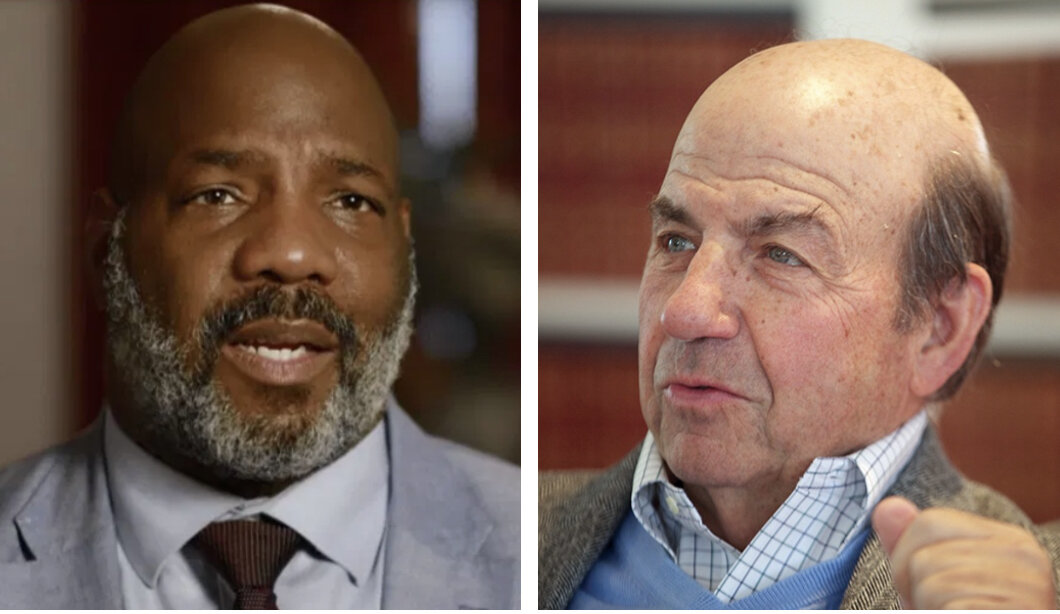MCIR LIVE: Two Writers for The New Yorker Talk About Race in America
In New York City, Jelani Cobb and Calvin Trillin had talked to each other at a dinner party given by The New Yorker’s current editor. Both Cobb and Trillin write for the magazine. They wanted to talk to each other some more, so last week MCIR LIVE gave them that chance.
The prolific Trillin’s work includes journalism, fiction, poetry, a memoir, humor, food and travel writing. He may be best known as a humorist because of his column in The Nation, called “Deadline Poet,” in which he skewers politics and politicians. He’s also distinguished as “the Charlie Chaplin of food writing,” in which he remains loyal to barbecue in Kansas City, Missouri, where he grew up. As a proper Midwesterner, he calls his home state “Mizourah.” In the early 1960s, when he was starting his career in Atlanta, he was “in and out of Mississippi as a reporter” covering the civil rights movement. He continued to write about race in America for the next 50 years.
Jelani Cobb, the Ira A. Lipman Center professor at Columbia Journalism School. and Calvin Trillin, who spent 50 years covering civil rights, discussed in Race in America with MCIR on Jan. 21.
In 1995, Trillin wrote about the Mississippi State Sovereignty Commission for The New Yorker, when some of the commission’s files were opened. The State Sovereignty Commission was Mississippi’s version of East Germany’s Stasi. From its establishment by Mississippi’s state Legislature in 1956 through 1977, when it ceased to exist, it spied on its own citizens for evidence of anything that could erode White supremacy: civil rights sympathy or activity, elementary-school curricula, even “mongrelization of the races.” Trillin was fascinated by “how small a deviation from the Mississippi way of life” was required to catch the commission’s attention.
For The New Yorker and for MCIR LIVE, Trillin recreated two Sovereignty Commission investigators’ visit to an unwed White mother in Grenada, a small north-central Mississippi city. Word on Grenada’s streets was that her new baby was Black. The investigators examined the infant’s fingernails because, Trillin said, a half-moon at the base of the nail, just above the cuticle, was a sure sign of Black blood. In Kansas City, Trillin said, “that was an article of faith in second grade,” along with the notion that Japanese had yellow blood.
The Sovereignty Commission investigation was inconclusive, partly because the baby’s nails were so tiny, partly because the wily mother told her visitors that the baby’s father was Italian. “Many years later,” Trillin recalled, “I read that when Italian immigrants first arrived here, they were considered Black.”
Much of what Trillin reported is happening all over again today. Jelani Cobb is Ira A. Lipman Professor of Civil and Human Rights Reporting at Columbia University School of Journalism, so he’s working on training a new generation of reporters to cover race in America. Like Trillin, he started out in Atlanta and has family roots there. “I think my maternal grandparents would find that so much of what we see today (in race relations) is familiar,” he told MCIR LIVE.
For The New Yorker and for PBS’s Frontline, Cobb has been covering Black Lives Matter and the contemporary civil rights movement. Since he knew Georgia politician Stacey Abrams slightly, he began talking to her for The New Yorker in 2018. They met again after her unsuccessful run for governor of Georgia that launched her movement, Fight Fair Action, to fight voter-ID laws and voter-roll purges that have affected voters of color disproportionately. Cobb quoted Mississippi’s 2020 Democratic senatorial candidate Mike Espy on consulting Abrams about campaigning: “Espy described his discussion with her as ‘a graduate course on politics.’”
Most recently, in 2020 and 2021, Cobb has reported on how Fair Fight Action and the new voters it helped to register made crucial differences in the 2020 Presidential election and the 2021 senatorial runoff election. Sadly, Espy got extra donations too late to devote them to voter registration campaigns in Mississippi.
During MCIR LIVE, Trillin was intrigued by Cobb’s linking of race and poverty. In White supremacists’ view, Cobb said, “White people imagine that all Black people are poor.” Cobb, who has a Ph.D., added, “I’ve been there!”
Cobb also explained the difference between North and South by quoting Black comedian Dick Gregory: “‘In the South, Whites don’t care how close I get so long as I’m not too high. In the North, they don’t care how high I get so long as I’m not too close!’”
You can listen to Trillin and Cobb’s entire conversation about race in America here.
For Trillin’s piece on the Mississippi State Sovereignty Commission, his 1964 plane ride with Martin Luther King and more of his reporting on race, Lemuria Books has signed first editions of Jackson, 1964 and Other Dispatches from Fifty Years of Reporting on Race in America. You also can find Cobb’s books, including The Substance of Hope, about the Obama Presidency, and a collection of essays, The Devil and Dave Chappelle. For Cobb’s ongoing reporting, follow Frontline and subscribe to The New Yorker.
Ann Marie Cunningham is a Columbia University Lipman Fellow for 2020 who will be working with the Mississippi Center for investigative Reporting. She is a veteran journalist/producer and author of a best-seller. Her work has appeared in The New York Times, Los Angeles Times, Technology Review, The Nation and The New Republic. Contact her at amc@mississippicir.org.


